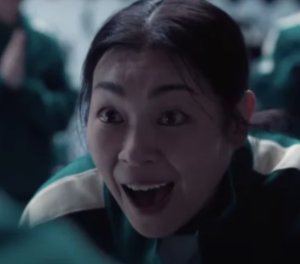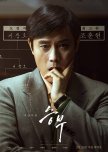A Quiet Duel of Legacy and Pride
*The Match* is a compelling drama film based on the real-life relationship between two of South Korea’s most iconic Go players: Cho Hun-hyun and his protégé-turned-rival, Lee Chang-ho. Set in the early 1990s, the film traces their journey from a bond of deep respect and trust to a dramatic confrontation on the board that reshapes both their lives.
The performances are the heart of this film. Lee Byung-hun is remarkable as Cho Hun-hyun, portraying a man torn between pride in his student and fear of being replaced. Yoo Ah-in brings a quiet intensity to Lee Chang-ho, expressing his character’s transformation from an obedient disciple into a confident and self-assured challenger. Their dynamic carries the film, grounding its emotional weight in realism and restraint.
The direction is subtle and patient. The film avoids melodrama, opting instead for a slow build of tension through deliberate pacing. The cinematography treats the Go board like a battlefield, using close-ups and careful lighting to give weight to every move.
One of the film’s strengths lies in its dialogue, which is thoughtful and philosophical. Lines like “A teacher is not someone who gives answers, but someone who opens the way” resonate far beyond the context of the game. The screenplay explores the loneliness of mastery, the burden of legacy, and the moment when every student must eventually step out of their teacher’s shadow.
There is also warmth and humor throughout the film, which balances the more intense moments. These touches humanize the characters and make their emotional journey all the more relatable.
It is a meditation on ambition, mentorship, and the bittersweet nature of growth. It’s a film that lingers because of the quiet, personal truths it reveals in the spaces between each move.
The performances are the heart of this film. Lee Byung-hun is remarkable as Cho Hun-hyun, portraying a man torn between pride in his student and fear of being replaced. Yoo Ah-in brings a quiet intensity to Lee Chang-ho, expressing his character’s transformation from an obedient disciple into a confident and self-assured challenger. Their dynamic carries the film, grounding its emotional weight in realism and restraint.
The direction is subtle and patient. The film avoids melodrama, opting instead for a slow build of tension through deliberate pacing. The cinematography treats the Go board like a battlefield, using close-ups and careful lighting to give weight to every move.
One of the film’s strengths lies in its dialogue, which is thoughtful and philosophical. Lines like “A teacher is not someone who gives answers, but someone who opens the way” resonate far beyond the context of the game. The screenplay explores the loneliness of mastery, the burden of legacy, and the moment when every student must eventually step out of their teacher’s shadow.
There is also warmth and humor throughout the film, which balances the more intense moments. These touches humanize the characters and make their emotional journey all the more relatable.
It is a meditation on ambition, mentorship, and the bittersweet nature of growth. It’s a film that lingers because of the quiet, personal truths it reveals in the spaces between each move.
Was this review helpful to you?


 1
1 3
3



















